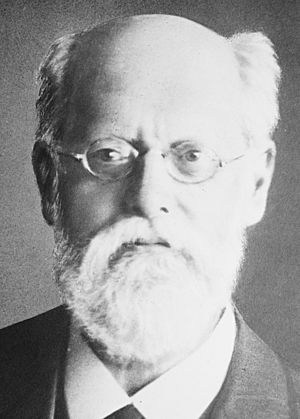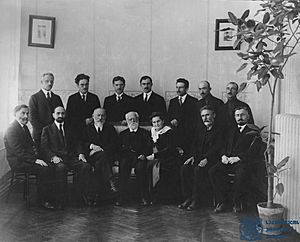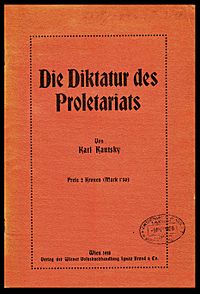Karl Kautsky facts for kids
Quick facts for kids
Karl Kautsky
|
|
|---|---|
 |
|
| Born |
Karl Johann Kautsky
16 October 1854 |
| Died | 17 October 1938 (aged 84) |
| Alma mater | University of Vienna |
| Spouse(s) |
Luise Kautsky
(m. 1890) |
| Era |
|
| Region |
|
| School | Orthodox Marxism |
|
Main interests
|
Political philosophy, politics, economics, history |
|
Notable ideas
|
Evolutionary epistemology, social instinct, active adaption, hyperimperialism |
Karl Johann Kautsky (born October 16, 1854 – died October 17, 1938) was an important thinker from Austria and the Czech Republic. He was a philosopher, a journalist, and a leading expert in Marxism. Marxism is a way of understanding society, economics, and politics based on the ideas of Karl Marx.
Kautsky was a main leader of the Social Democratic Party of Germany (SPD) and the Second International, which was a group of socialist and labor parties from around the world. He believed in what was called "orthodox Marxism." This meant he thought Marx's ideas were like a science, focusing on how history is shaped by money and power, and that certain things are bound to happen in society. His way of thinking about Marxism was very popular in Europe for about 20 years, from 1895 to 1914.
Born in Prague, Kautsky studied at the University of Vienna. In 1875, he joined the Social Democratic Party of Austria. Later, in 1883, he started and edited a very important socialist magazine called Die Neue Zeit. From 1885 to 1890, he lived in London and worked closely with Friedrich Engels, who was Marx's friend. Kautsky became very active in the SPD in Germany. He helped write the theory part of the party's Erfurt Program in 1891, which influenced many other socialist parties in Europe. He left the SPD briefly in 1917 to join another party because he disagreed with the SPD supporting World War I. However, he rejoined in 1922. By the 1930s, his role in politics became smaller, and he passed away in Amsterdam in 1938.
Kautsky believed that history couldn't be rushed. He thought that workers and their political parties should wait for the right economic conditions before a socialist revolution could happen. Because of his ideas, the SPD decided to work slowly and steadily. They used the existing parliamentary democracy to make life better for workers. Kautsky believed that capitalism would eventually fall apart on its own. His views led to disagreements with other famous Marxists. For example, he argued with Eduard Bernstein, who wanted more gradual changes, and Rosa Luxemburg, who believed in sudden, revolutionary action. He also disagreed with Vladimir Lenin, saying that Lenin's revolution in Russia in 1917 was too early and was leading the Soviet Union towards a harsh government.
Contents
Karl Kautsky's Life and Work
Early Years and Education
Karl Kautsky was born in Prague on October 16, 1854. His family was artistic and middle class. His father, Johann Kautsky, was a scenic designer, and his mother, Minna Kautsky, was an actress and writer. When Karl was seven, his family moved to Vienna.
He studied history, philosophy, and economics at the University of Vienna starting in 1874. In 1875, he became a member of the Social Democratic Party of Austria. Soon after, he began writing for German and Austrian socialist magazines. In 1880, he joined a group of German socialists in Zürich. This group secretly brought socialist writings into Germany during a time when such materials were banned.
His Political Career
In 1883, Kautsky started a monthly magazine called Die Neue Zeit ("The New Times") in Stuttgart. It became a weekly magazine in 1890. He edited this magazine until 1917, which gave him a steady income and a way to share his Marxist ideas.
From 1885 to 1890, he lived in London. There, he became a close friend of Friedrich Engels, who was Karl Marx's longtime collaborator. Kautsky became a well-known Marxist thinker in 1888. This happened when Engels asked him to help edit Marx's important work, Theories of Surplus Value. In 1891, Kautsky helped write the Erfurt Program for the Social Democratic Party of Germany (SPD) along with August Bebel and Eduard Bernstein.
After Engels died in 1895, Kautsky became one of the most important and respected Marxist thinkers. He represented the main ideas of the SPD, along with August Bebel. He also developed a Marxist theory about imperialism, which is when powerful countries extend their influence over weaker ones. When Bernstein suggested that a revolution might not be necessary, Kautsky strongly disagreed. He argued that Bernstein's ideas could lead to socialists working with the wealthy instead of focusing on the working class.
During the World War
In 1914, when World War I began, German Social-Democrat politicians in the Reichstag (the German parliament) voted to support the war. Kautsky, who was at their meetings, suggested they should not vote either way. He first thought Germany was fighting to defend itself against Russia. However, by June 1915, it was clear the war was going to be long and terrible. Kautsky, along with Eduard Bernstein and Hugo Haase, spoke out against the SPD leaders who supported the war. They criticized Germany's goals to take over other lands. In 1917, Kautsky left the SPD and joined the Independent Social Democratic Party of Germany (USPD) with other socialists who were against the war.
After the November Revolution in Germany, Kautsky worked in the government for a short time. He helped find documents that showed Imperial Germany was not entirely to blame for starting the war.
After the War

In 1920, the USPD party split. Kautsky joined a smaller group that went back to the SPD. He visited the country of Georgia in 1920 and wrote a book about the Democratic Republic of Georgia. At that time, Georgia was still free from Bolshevik Russia. However, by the time his book was published in 1921, the Red Army had invaded Georgia, and the Bolsheviks had taken control. Kautsky then believed the Soviet Union had become an imperialist state. He thought this because of the damage from the invasion and because ordinary workers had very little power in Soviet Russia.
Kautsky helped create the party plan adopted by the German Social Democratic Party in Heidelberg in 1925. In 1924, at age 70, he moved back to Vienna with his family. He stayed there until 1938. When Adolf Hitler took over Austria (an event called the Anschluss), Kautsky fled to Czechoslovakia. From there, he flew to Amsterdam, where he died in the same year.
Karl Kautsky lived in Berlin-Friedenau for many years. His wife, Luise Kautsky, became a close friend of Rosa Luxemburg, who also lived in Friedenau. A special plaque marks where Kautsky lived at Saarstraße 14.
Vladimir Lenin called Kautsky a "renegade" (someone who abandons their beliefs) in his book The Proletarian Revolution and the Renegade Kautsky. Kautsky, in turn, strongly criticized Lenin in his 1934 book Marxism and Bolshevism: Democracy and Dictatorship. He wrote:
The Bolsheviki under Lenin's leadership, however, succeeded in capturing control of the armed forces in Petrograd and later in Moscow and thus laid the foundation for a new dictatorship in place of the old Czarist dictatorship.
In his writings, Kautsky often talked about the Bolshevik (Communist) rule in Russia. He saw the Bolsheviks as a secret group that took power through a sudden takeover. He believed they started big changes that didn't make sense for Russia's economy. Instead, he argued, a society controlled by a huge government system developed. He felt the problems of this system were worse than the problems of Western capitalism. He said:
Foreign tourists in Russia stand in silent amazement before the gigantic enterprises created there, as they stand before the pyramids, for example. Only seldom does the thought occur to them what enslavement, what lowering of human self-esteem was connected with the construction of those gigantic establishments. …They extracted the means for the creation of material productive forces by destroying the most essential productive force of all – the laboring man. In the terrible conditions created by the Piatiletka, people rapidly perished. Soviet films, of course, did not show this.
Death and His Legacy
Kautsky died on October 17, 1938, in Amsterdam. His son, Benedikt Kautsky, was held in concentration camps for seven years. Sadly, his wife, Luise Kautsky, was killed in Auschwitz.
Kautsky is remembered for his strong arguments against the Bolsheviks. He is also known for editing and publishing Karl Marx's important work, Capital, Volume IV, which is usually known as Theories of Surplus Value.
Karl Kautsky's Books in English
- The Economic Doctrines of Karl Marx. (1887/1903)
- Thomas More and his Utopia. (1888)
- The Class Struggle (Erfurt Program). (1899)
- Communism in Central Europe at the Time of the Reformation. (1897)
- Forerunners of Modern Socialism, 1895.
- Frederick Engels: His Life, His Work and His Writings. (1899)
- On the Agrarian Question (1899)
- The Social Revolution and On the Day After the Social Revolution. (1903)
- Socialism and Colonial Policy (1907)
- The Historic Accomplishment of Karl Marx (1908)
- Ethics and the Materialist Conception of History. (1909)
- The Road to Power (1909)
- Finance-Capital and Crises (1911)
- The High Cost of Living: Changes in Gold Production and the Rise in Prices. (1914)
- The Guilt of William Hohenzollern. (1919).
- The Dictatorship of the Proletariat. (c. 1919).
- Terrorism and Communism: A Contribution to the Natural History of Revolution. (1920).
- "Preface" to The Twelve Who Are to Die: The Trial of the Socialists-Revolutionists in Moscow. (1922).
- Foundations of Christianity: A Study of Christian Origins. (1925).
- The Labour Revolution. (1925).
- Are the Jews a Race? (1926).
- Communism vs. Socialism. (1932).
See also
 In Spanish: Karl Kautsky para niños
In Spanish: Karl Kautsky para niños
- The Proletarian Revolution and the Renegade Kautsky, a response to Kautsky written by Vladimir Lenin. (1918). Text.
- Terrorism and Communism, a pamphlet written by Leon Trotsky in response to a Kautsky pamphlet by the same name (1920). Text.
 | Delilah Pierce |
 | Gordon Parks |
 | Augusta Savage |
 | Charles Ethan Porter |


